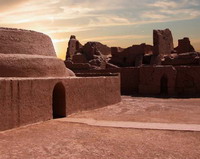|

The term "Turkistan" appeared in Arabic geographical works in the Middle Ages. It meant "the region of the Turks" and referred to the areas north of the Sir River in Central Asia and the adjoining areas to the east of the river. With the evolution of history, the modern ethnic groups in Central Asia were established one after another. By the 18th century, the geographical concept of "Turkistan" was already very vague, and almost nobody used it again in the historical records of the time.
In the early 19th century, with the growing colonial expansion of the imperialist powers into Central Asia, the geographical term "Turkistan" was revived. In 1805, Timkovsky, a Russian, used the term "Turkistan" again in a diplomatic mission's report to describe the geographical position of Central Asia and the Tarim Basin in China's southern Xinjiang. In view of the different histories, languages, customs and political affiliations of the two areas, he called the Tarim Basin in China's Xinjiang situated to the east of "Turkistan" as "East Turkistan" or "Chinese Turkistan". In the middle of the 19th century, Russia annexed the three Central Asian khanates of Khiva, Bukhara and Kokand one after another, and set up the "Turkistan Governorship" in the Hezhong (Samarkand) area of Central Asia. Therefore, some people in the West called the Hezhong area "West Turkistan" or "Russian Turkistan", and China's Xinjiang region "East Turkistan".
In the early 20th century and later, a small number of separatists and religious extremists in Xinjiang, influenced by the international trend of religious extremism and national chauvinism, politicized the unstandardized geographical term "East Turkistan", and fabricated an "ideological and theoretical system" on the so-called "independence of East Turkistan" on the basis of the allegation cooked up by the old colonialists. They claimed that "East Turkistan" had been an independent state since ancient times, its people with its history of almost 10,000 years being "the finest nation in human history". They incited all ethnic groups speaking Turki and believing in Islam to join hands to create a theocratic state. They denied the history of the great motherland jointly built by all the ethnic groups of China. They clamored for "opposition to all ethnic groups other than Turks" and for the "annihilation of pagans", asserting that China had been "the enemy of the 'East Turkistan' nation for 3,000 years". After the "East Turkistan" theory came into being, separatists of all shades raised the banner of "East Turkistan' to carry out activities aimed at materializing their vain wish of establishing an "East Turkistan state".
From the early 20th century to the late 1940s, the "East Turkistan" forces created many disturbances with the connivance and support of hostile foreign forces. In November 1933, Sabit Damolla and others founded the so-called "East Turkistan Islamic Republic" in Kashi, but it collapsed in less than three months thanks to the opposition of the people of all ethnic groups in Xinjiang. In 1944, the "Revolution of the Three Regions", which was part of Chinese people's democratic revolutionary movement, broke out against the Kuomintang rule (the three regions referred to Ili, Tacheng and Altay), but separatist Elihan Torae (an Uzbek from the former Soviet Union) usurped the leadership of the revolution in its early days, and founded the so-called "Republic of East Turkistan" in Yining, with himself as its "chairman". In June 1946, Ahmatjan Kasimi and Abdukerim Abbasov, leaders of the revolution, dismissed him from that post, and reorganized the "Republic of East Turkistan" as the Advisory Council of the Ili Subprovincial Administrative Region, dealing a fatal blow at the separatist forces.
Since the peaceful liberation of Xinjiang, the "East Turkistan" forces have never resigned themselves to their defeat. The tiny group of separatists who had fled abroad from Xinjiang collaborated with those at home, and looked for opportunities to carry out splittist and sabotage activities with the support of international anti-China forces. Especially in the 1990s, influenced by religious extremism, separatism and international terrorism, part of the "East Turkistan" forces both inside and outside China turned to splittist and sabotage activities with terrorist violence as their chief means. Some "East Turkistan" organizations openly stated that they would use terrorist and violent means to achieve their purpose of separation. The "East Turkistan" forces in China's Xinjiang and relevant countries plotted and organized a number of bloody incidents of terror and violence, including explosions, assassinations, arsons, poisonings and assaults, seriously jeopardizing the lives, property and security of the Chinese people of various ethnic groups, and social stability in Xinjiang, and posing a threat to the security and stability of the countries and regions concerned.
After the September 11 incident, the voices calling for an international anti-terrorist struggle and cooperation have become louder and louder. In order to get out of their predicament, the "East Turkistan" forces once again have raised the banner of "human rights", "freedom of religion" and "interests of ethnic minorities", and fabricated claims that "the Chinese government is using every opportunity to oppress ethnic minorities", to mislead the public and deceive world opinion in order to escape blows dealt by the international struggle against terrorism.
 China tours inclusive of visiting Urumqi China tours inclusive of visiting Urumqi
|
|